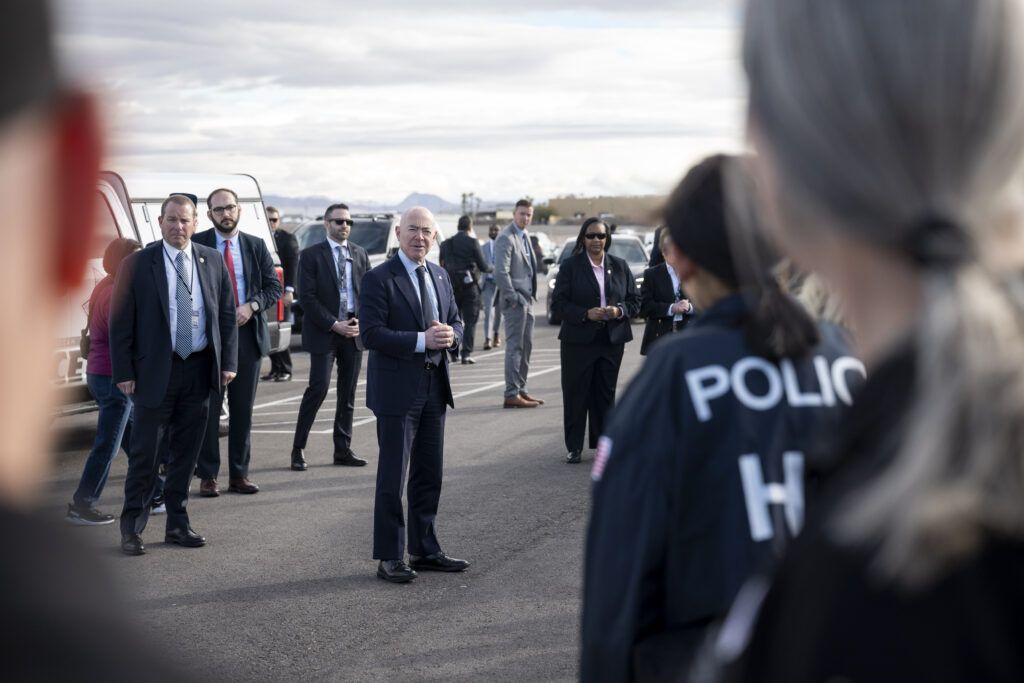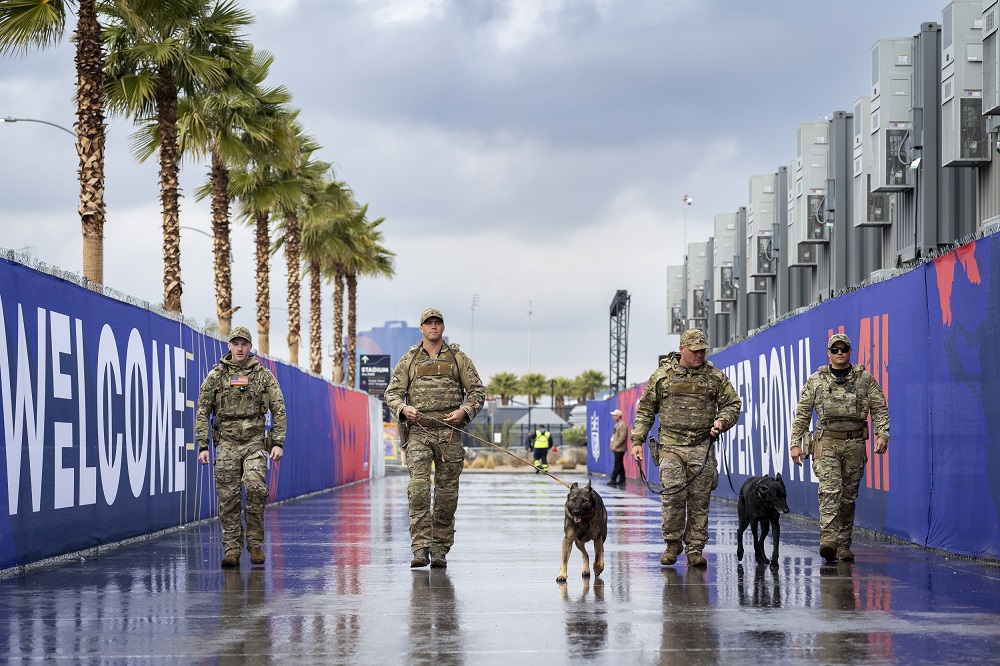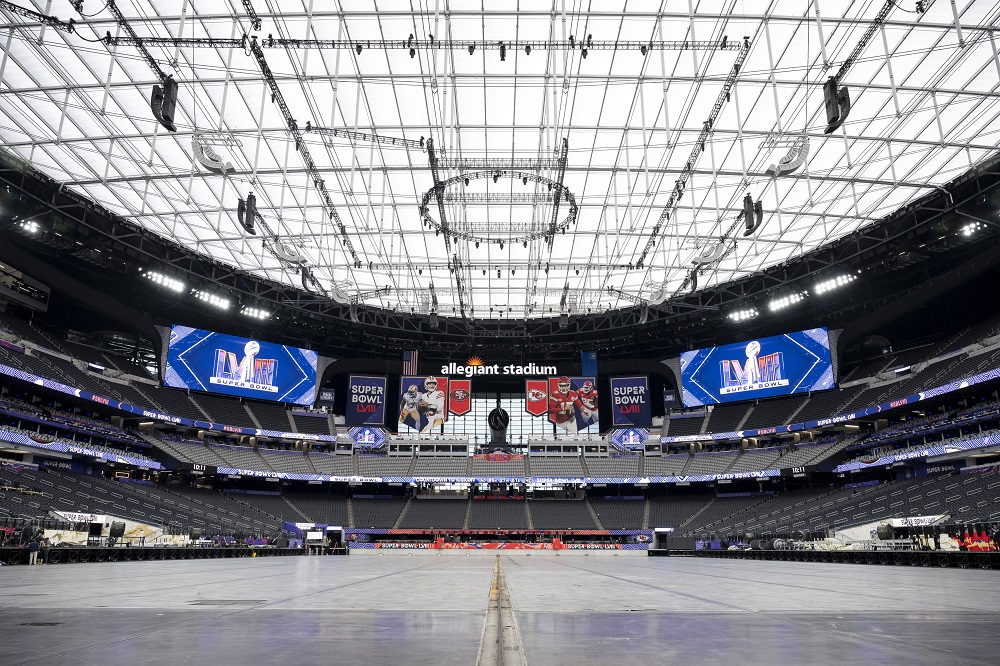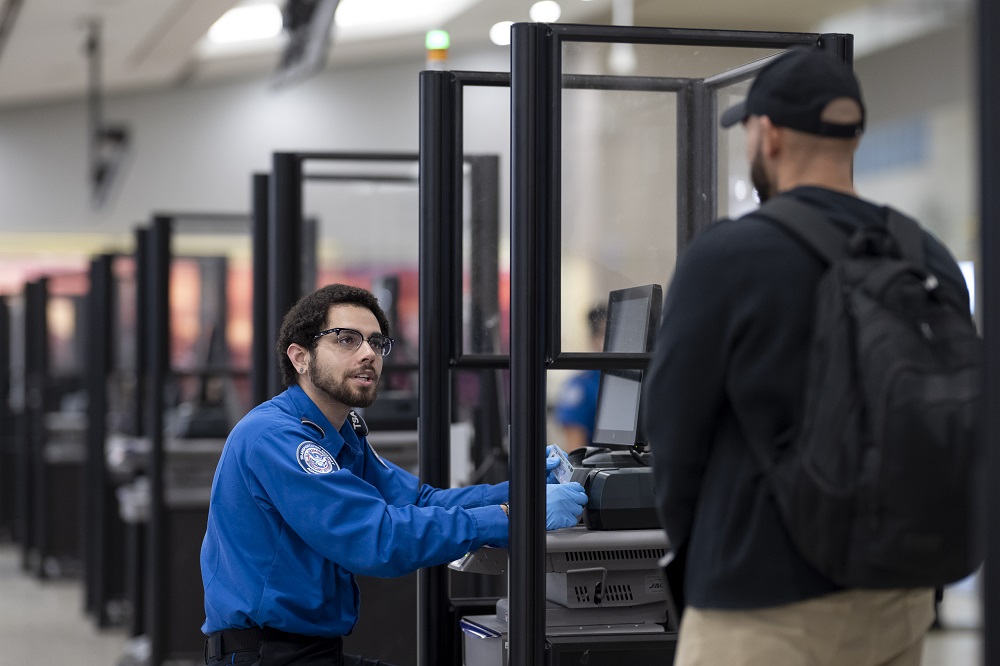Secretary of Homeland Security Alejandro N. Mayorkas traveled this week to Las Vegas to review U.S. Department of Homeland Security (DHS) operations for Super Bowl LVIII with state and local law enforcement and the National Football League (NFL).

For the past 18 months, DHS employees worked with local officials to assess potential risks and developed plans to address them. DHS has led federal efforts to ensure the safety and security of employees, players, and fans at the Super Bowl for the last two decades.
Over 385 DHS personnel are deployed in Las Vegas to provide extensive air security resources; venue, cyber, and infrastructure security assessments; chemical, biological, radiological, nuclear, and explosives detection technologies; intelligence analysis and threat assessments; intellectual property enforcement; and real-time situational awareness reporting for our partners.
Mayorkas said DHS and partners are “working to ensure that the 65,000 people attending Super Bowl LVIII and the millions of people gathering together and enjoying the game across the country are all safe.”
He noted, ”There are no known, credible, specific threats to the Super Bowl or to Las Vegas at this time—but we are vigilant, and we are prepared.”
Security Playbook
U.S. Secret Service Special Agent in Charge Karon Ransom is serving as the lead Federal Coordinator for Super Bowl LVIII. Personnel from 12 DHS component agencies and offices are in Las Vegas conducting the following activities to protect fans and attendees:

Identifying, Assessing, and Mitigating Potential Risks: DHS constantly evaluates a range of potential risks, from acts of terrorism to cybersecurity vulnerabilities, and takes steps to mitigate them.
- The Cybersecurity and Infrastructure Security Agency (CISA) conducted physical and cybersecurity vulnerability assessments, planning exercises, and bomb safety workshops with state and local partners ahead of the event.
- The Office of Intelligence & Analysis is working with the FBI to assess the threat landscape leading up to the Super Bowl; this includes sharing timely and actionable information and intelligence with their state and local partners.
- The Countering Weapons of Mass Destruction Office (CWMD) is providing surge support from its Mobile Detection Deployment Program and its BioWatch program in coordination with the City of Las Vegas. The U.S. Coast Guard’s (USCG) Pacific Strike Team is also supporting the Mobile Detection Deployment Program to bolster DHS’s ability to detect and interdict chemical, biological, radiological, and nuclear threats.
- The Transportation Security Administration (TSA) will have a Supervisory Federal Air Marshal staffing the Fusion Watch Center, the primary command center for the Las Vegas Metropolitan Police Department, during the event.
- U.S. Customs and Border Protection’s (CBP) Air and Marine Operations (AMO) will support Super Bowl security operations enforcing temporary flight restrictions around Allegiant Stadium during Super Bowl LVIII. AMO will provide “eye in the sky” intelligence, surveillance, and reconnaissance flight operations in and around the various NFL venues to provide situational awareness and enhance overall security operations.
- The NFL received a SAFETY Act Designation from DHS, allowing Allegiant Stadium to invest in the most current security technologies, procedures, services, controls, and systems contributing to structural and physical security during the Super Bowl. These measures grant providers of those technologies’ liability protections in the event of a terrorist attack.
- For the first time at a Super Bowl, the Science & Technology Directorate (S&T) will deploy easy-to-assemble, expandable security barriers that can be installed quickly to provide critical asset protection and intrusion prevention to fill coverage gaps in security at the stadium.
- DHS is also continuing its partnership with the NFL on the “If You See Something, Say Something” public awareness campaign during the Super Bowl. DHS is working with the Southern Nevada Counterterrorism Center and Las Vegas Police Department using social media and digital displays within the stadium and outreach throughout the Las Vegas area to raise public awareness of the importance of reporting terrorism-related suspicious activity. In partnership with the TSA, the campaign also launched its general awareness video at Harry Reid International Airport (LAS) for residents and visitors traveling to and from Las Vegas.
- On Super Bowl Sunday, the Southern Nevada Counter Terrorism Center will partner with the NFL and DHS to host a tip line where the public and game attendees can report suspicious activity. For attendees within Allegiant Stadium, they may call (702) 828-7777 or text (725) 780-2345. Outside of the stadium, the public may call (702) 828-7777 or local authorities.
Actively Screening and Monitoring People, Goods, and Vehicles for a Range of Threats: DHS is leveraging its significant technology assets and dedicated personnel to protect the Super Bowl stadium, Super Bowl week events, and city of Las Vegas against potential threats.

- TSA is utilizing its National Deployment Force to increase the number of transportation security officers who will be working at LAS to screen the increased number of departing passengers following the Super Bowl. TSA explosive detection canines and their handlers will be working during Super Bowl week events at key venues including the Mandalay Bay South Convention Center, Allegiant Stadium, and LAS. TSA will also have four Visible Intermodal Prevention and Response (VIPR) teams on the ground to conduct increased counter-terrorism patrols.
- The USCG is providing five Canine Explosive Detection teams to ensure the safety and security of the event.
- CBP is providing assets including aviation security, video surveillance capabilities, and non-intrusive inspection of vehicles and cargo. CBP officers are also scanning the cargo entering the stadium for contraband such as narcotics, weapons, and explosives.
Leading Emergency Response Efforts, if They Should Occur: DHS is taking steps to mitigate risk, align resources, and coordinate communication between security personnel at all levels of government.
- The Federal Emergency Management Agency (FEMA) supports state and local governments by providing communication tools to help keep fans safe by ensuring state and local responders have the ability to communicate with each other and the public.
- A Homeland Security Investigations (HSI) Special Response Team is standing by to provide interior stadium tactical support if needed.
- On Super Bowl Sunday, CISA will also deploy Advisors and Emergency Communications Coordinators to support local law enforcement, emergency responders, and private partners in Las Vegas.
Preventing Human Trafficking: Crimes like human trafficking can be more prevalent during events like the Super Bowl due to the mass volume of people and anonymity that large gatherings provide.

- In a historic partnership, major rideshare company Lyft and the DHS Blue Campaign, part of the DHS Center for Combating Human Trafficking, announced a new effort to educate Lyft drivers in the Las Vegas area during Super Bowl week to ensure they have the tools and campaign resources to recognize the signs of human trafficking.
- DHS Blue Campaign is also disseminating digital and out-of-home advertising in the Las Vegas area to raise awareness among visitors, local residents, and those working in industries such as hotels, hospitality, and transportation.
- The campaign’s Blue Lightning Initiative is also partnering with Harry Reid International Airport to raise awareness and train staff to recognize and report human trafficking.
Protecting Fans from Counterfeit Goods and Services: DHS is also surging resources with CPB and HSI to identify and target the vendors of counterfeit merchandise and tickets.
For the past 20 years, DHS has provided security assistance to the NFL Super Bowl because of the event’s significant national and/or international importance, which requires extensive federal interagency support to resolve any resource gaps in security planning. DHS assessed the Super Bowl this year as a Special Event Assessment Rating (SEAR) Level 1 event.
The extensive security measures implemented for this Super Bowl build on success protecting large-scale events in the last year, where DHS helped secure 18 SEAR events—including the first ever designations for the Chicago NASCAR Street Race, the NFL Draft, and the Boston Marathon—and three National Special Security Events (NSSE).
All photos courtesy of DHS’s X account
ALSO READ: Allegiant Stadium: MVP for Super Bowl LVIII
